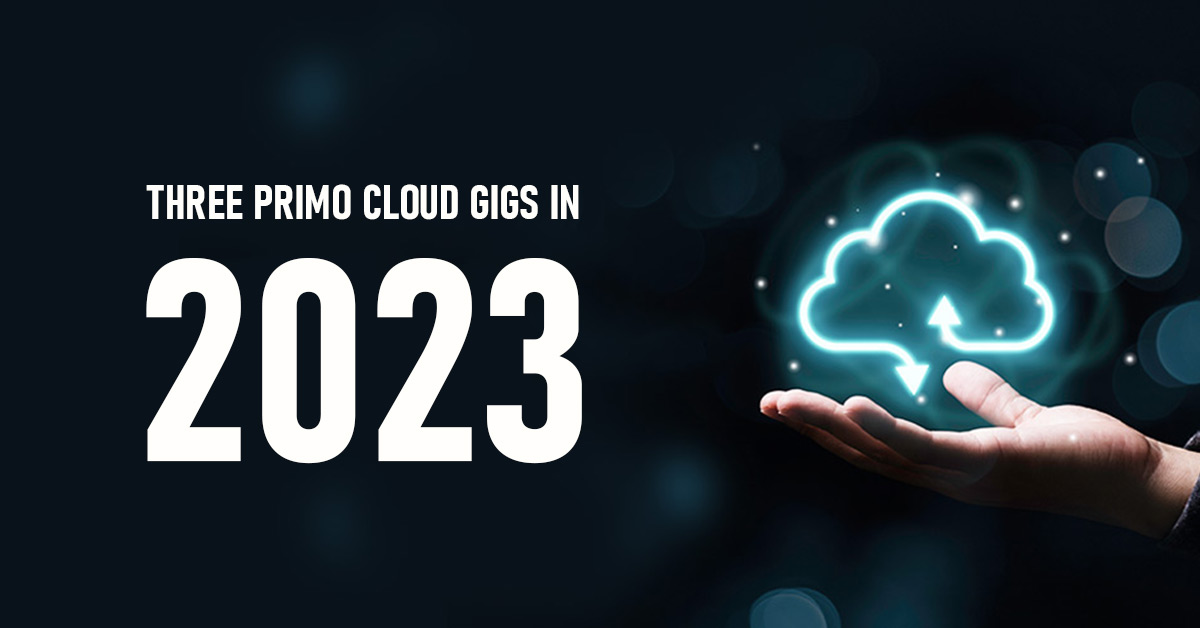Three Primo Cloud Gigs in 2023

Data Scientist
Deep learning and machine learning specialist, well-versed with experience in Cloud infrastructure, Block-chain technologies, and Big Data solutions.
November 10, 2022

The Cloud Computing
Cloud computing, the latest IT technology, has taken the world by storm through providing loads of data storage options in this modern era. In the USA, it started as a subscription-based service wherein people get a network storage space allotted to them by giant IT services companies like Google, Microsoft, and Amazon. Computer resources provide individuals with the cloud services they seek. With a proper internet connection, one can access the cloud technology to which they have uploaded all the data so that it gets accessible from anywhere.
Cloud technology is a perfect boon to every people. The beneficiaries include people who deal with any data, data analysts, and business personnel. It brought in a much-needed revolution in the data storage and analysis sector. With cloud technology, one can access data from anywhere at any time through the internet. People need not carry big binders or records of their data physically in hand everywhere they go. All people need is an internet connection and an account in any Cloud Provider Server such as Google, Microsoft, or Amazon.
Businesses and organizations or enterprises benefit from Cloud Technology much more than they impact the lifestyle of people who use the internet. It considerably reduces the infrastructure costs needed to maintain a record room and subsequent hardware, as was the case in the pre-cloud era. SMEs can now store their valuable data in cloud technology while deducting the unnecessary costs of purchasing and keeping memory devices. Cloud technology allows a business enterprise to purchase ample space for a reduced subscription over a period of time, apt for storing data for appropriate perusal.
Cloud technology trumps the convention. Different types of clouds help with your apt business or personal requirements. One can look into various options the cloud technology offers a provider before attaining the right subscription package on a monthly or yearly basis. These subscription cloud packages are ideal for your business or personal needs and requirements.
The four types of clouds include Public Cloud, Private Cloud, Community Cloud, and Hybrid Cloud. Public Cloud gets accessed by any subscriber with a proper internet connection with access to cloud space. A private Cloud is an organization-based one used by businesses. Community Cloud gets shared between two or more organizations. Hybrid Cloud Technology is a mix of two types of cloud space settings. It is beneficial to all relevant users. There are three types of cloud service providers. These include Software as a Service (SaaS), Platform as a Service (PaaS), and an Infrastructure as a Service (IaaS) system.
With a lot of features that are beneficial to either people and business organizations or enterprises, cloud technology has gained ample traction and reputation among people. Google Cloud Services, Amazon Web Services, and Microsoft Azure Cloud Services are pioneers in providing cloud to any business and people. Our focus lies in discussing three primo cloud gigs in 2023. The Cloud technology keeps on evolving into a better version.
The Cloud Boom
The recent cloud boom is rejuvenating and refurbishing the whole data industry. It is boosting the pay scale and reputation of relevant roles. The cloud boom got triggered by Amazon when they launched and released Amazon Web Services (AWS) in 2002, which included a suite of cloud-based infrastructure services & facilities. IN 2006, Amazon launched Elastic Compute Cloud (EC2) as a Commercial Web Service. It helped businesses to rent computers to create their own applications.
The Cloud computing and storage got utilized properly by SMEs to launch startups, entrepreneurship, and businesses. Google followed suit by targeting these arenas. IaaS Models developed as one of the main pillars of the Cloud Boom.
Microsoft Azure Cloud came in with the PaaS Model and extended its reach to IaaS. Thus, the Cloud Boom happened, which brought in competitive designations such as a Cloud Architect, Operations Manager, and Security Manager, among others.
Cloud Computing & its professional pathways
Intrigue galore when thinking about the nuances of cloud computing and the career path one should take in this field. In this technological era, it is not a secret that Cloud Job Market is on fire. As the adage goes, Strike while the iron is hot, and the emergence of pandemic-driven cloud computing procedures helped a lot of businesses to create a perfect revolutionary storm in this arena. Most organizations realized the significance of many architectural and implementation mistakes while keeping pace with the rapid growth of multi-cloud and complex Cloud Computing Systems. Sound planning and great cloud architecture help mitigate the ensuing cloud computing complexities. So, it is wise to consider the three significant job opportunities in the cloud computing sector. These include designations like a Cloud Architect, a Cloud Operations Manager, and a Cloud Security Engineer that boldly define the cloud-computing industry.
Cloud Architect
The Cloud Computing revolution has opened up opportunities for Cloud Architects. Great Cloud Architects with ample expertise and experience design clouds that get customized for the requirements of an organization. Being a Cloud Architect leads to several related leadership opportunities, which define the very essence of this area. Cloud Architects does not require a specific certification. However, organizations and enterprises keep an eye out for those with brand-specific Cloud Architecture certifications. Basically, a Cloud Architect understands the wide variety of technologies associated with the area, which does not limit to a single brand. As part of understanding the nuances of a cloud, the architect focuses on its legacy, edge, and other emerging architecture patterns and technologies. Cloud Architects arrive from diverse backgrounds, having worked with several platforms and developing a deep understanding of Cloud Architecture across all brands. Proper training gets done through ample practice by working on many Cloud Projects simultaneously. After being technical leaders for several years, these Cloud developers move on to become expert Cloud Architects. It is how the position of Cloud Architects gets fulfilled within an organization or enterprise.
Cloud Operations Manager Engineer
A developed cloud needs a Cloud Operations Manager and engineer who is well-versed in all its operating patterns and nuances. Many organizations and enterprises have hit on an operational complexity wall wherein it becomes difficult to solve this complexity with technology. So, currently, enterprises look for talents who can tackle several complex problems. The Cloud Operations Manager Engineer has their hands full while dealing with all related complexities and nuances. A Cloud Operations Engineer works well single-handedly on Cloud Operations or cloudops as part of developing operations (DevOps) for the cloud. The engineer should be well-versed in understanding the cloud development, testing, and deployment. The core idea of this role is that a professional Cloud Operations Management Engineer focuses on operating public clouds in single and multi-cloud settings. A wide array of skills that range from performance engineering, observations, AI-ops, and other applications involving data level monitoring & security operations, gets displayed as part of being a Cloud Operations Manager Engineer in any setup.
Training is pivotal for excelling at this job with due diligence. The Cloud Operations Manager Engineering deals with various operations certifications, which become typically specific to a cloud brand.
Cloud Security Engineer
Being a Cloud Security Engineer is one of the most significant designations in this cloud computing industry. Business enterprises cannot afford to lowball this position used to its extreme importance. A Cloud Security Engineer responsibly uses the skills to design, implement, update, and operate a security system that keeps the organization in its pristine condition from the standpoint of its brand value. The knowledge base for a Cloud Security Engineer is vivid, with a deep understanding of cloud computing security, data & storage security, network security, identity management, and multifactor authentication. Organizations look for certain qualities with which a Cloud Security Engineer can thrive and become one of the best in this sector.
A core talent is needed to design, deploy, and operate cloud computing systems. The training and potential talent get leveraged systematically to develop a single or multi-cloud deployment. Poor Cloud Security Engineering has given rise to many cloud computing security incidents, which need to be reviewed and kept in check. A ton of security certifications and courses related to various cloud brands help to understand how each cloud provides the best security while designing & implementing cross-cloud security to solve many related holistic problems. Keep training as a Cloud Security Engineer until you excel in the field with due diligence.
Conclusion
The technical article and discussion focus on the three primo cloud gigs in 2023. Technologically, cloud computing has become a requirement among all people and business personnel. The high demand roles and designations in this sector include being a Cloud Architect, Cloud Operations Manager Engineer, and the Cloud Security Engineer. These three pivotal roles become a strong foundation to hold the cloud computing services at a highly professional and competent marketplace. Thus, these three are the most significant gigs that drive cloud computing to an escalated high quality level when it enters the upcoming year of 2023 with aplomb.













